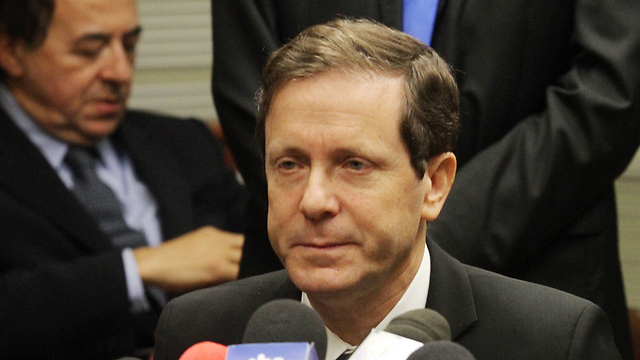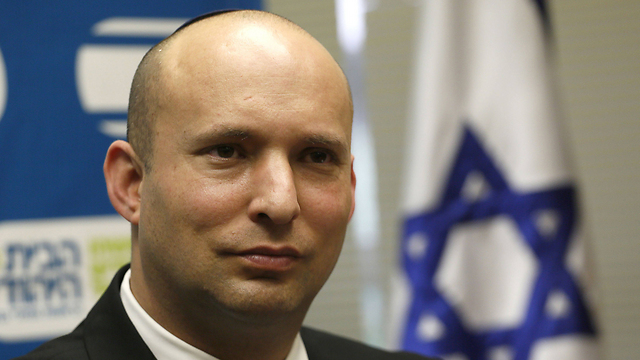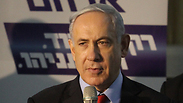
Netanyahu, tragic hero of 2015 elections
Op-ed: For all his in-depth surveys, for all his electoral experience, Netanyahu doesn't understand the extent of his problematic nature in the eyes of the electorate; maybe he simply is incapable of understanding.
Towards the end of the week, came the election euphoria of Labor - sorry, Zionist Union. The surveys, which indicated a lead over the Likud of three or four seats, lifted the mood sky-high.
It had no less of an impact on Benjamin Netanyahu's behavior, as he ran around like a man possessed, hugging, kissing, spitting the words "Tzipi and Buji" into every microphone like an ancient curse, as if they were whispering to him to summon them from beyond. Abracadabra – Tzipi and Buji. Maybe he knows something we don't, they rejoiced. Netanyahu has in-depth surveys, broad analysis, intelligence on the ground. His panic heralds our victory.
The euphoria does not sit well with them. Like the fans of the Hapoel Tel Aviv of yesteryear, it is easier for them to deal with loss. Moreover, the victory has not yet been achieved. And it is even difficult to define what victory is: the Zionist Union may lead, but only the Likud will be able to form a government; or the results will lead to the establishment of a national unity government headed by Netanyahu. There is no guarantee that the game will be decided on Tuesday, one way or another.
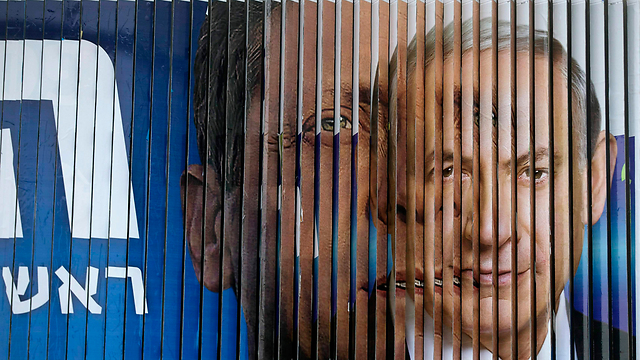
Elections are not conducted in a sterile zone. They are by nature loaded with manipulation, lies and blows below the belt. The 2015 campaign can be said to have been especially dirty, ugly and duplicitous. And leading the charge was Bayit Yehudi leader Naftali Bennett. In his version of events, it all began with a campaign by activists from the gay community, who attacked the open homophobes on his Knesset list. Bennett chose to react violently, firing aggressive messages in all directions, never ceasing with this wild behavior until he revealed all his recklessness, all leave of his senses. Since then he has calmed down, but it was too late: The entire political system followed in his wake.
What will be with Tuesday's election results will be. Netanyahu is the tragic hero of the 2015 elections. In the tumult of the elections we forgot, and Netanyahu forgot, that he was the one that initiated this: He could have carried on for at least another two years, a conflicted but functioning prime minister, more or less, of a government that he would miss in the future.
Despite all his in-depth surveys, despite all his electoral experience, Netanyahu did not understand the extent of his problematic nature in the eyes of the electorate. Maybe he simply is incapable of understanding. It is hard to sense the rot alone, especially when one is surrounded by a gaggle of sycophants who refrain from telling the truth, and a wife breathing down his neck.
In the two years since the last election, voters veered right when it came to their faith in the peace process and the future of the country as part of the Middle East. In a sense, Israelis have gone back to living in splendid isolation, as they lived until 1967.
But at the same time, another process has taken place, one that has far more electoral significance - Israelis are tired of Netanyahu. They has exhausted them and he them. After nine years as prime minister (three and four and two), and 22 years in the headlines, the magic has gone. He can take comfort in the fact that this phenomenon happened to those far greater than him, David Ben-Gurion for example, and under far more difficult circumstances. Netanyahu's attempts to reinvent himself as the grand old man, as a responsible adult, have failed.
Netanyahu lacks the rural ease that Sharon possessed in final term; he lacks the spiritual strength of Peres, a benefit of age. There's something reassuring and comforting about gray hair, but not the coiffure chemically glued to Netanyahu's pate.
Netanyahu has recognized the problem – he is good at identifying such matters - and met it with a desperate assault on the voter. It may have been smarter to go the route of what is called in American politics a "Rose Garden campaign" – a campaign based on the power that comes with the job, without any unnecessary running around. A trip to the US, yes - it impresses voters - but running around Kiryat Motzkin and Ashkelon, from market to market, from video clip to video clip, only exacerbates the sense of disgust. It is a case of "enough already." Netanyahu has become the guest who overstays his welcome – he came, sat down and forgot to leave.
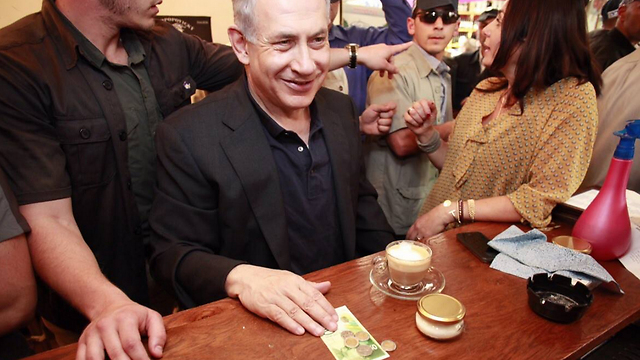
But neither of Netanyahu's last two tenures was a complete failure – that would be a patently unfair summary. There were some very good decisions made (such as investments in transportation and cybernetics) and very bad decisions (such as the crisis with the US administration). There was a dearth of decision-making primarily in areas that Netanyahu does not view as "real life", such as the cost of housing and the cost of living. But the reader is invited to note something unique to Netanyahu - the appreciation for him comes in cycles.
As we move through these cycles, the greater the friction grows, and people appreciate him less, are more fearful because of him. The chant "Just not Netanyahu" did not come from a secret conference of leftist organizations, it came from people who had been there, and who got burned. See, for example, our recent interview with Meir Dagan.
It seems that the media in this election was more hostile, more aggressive and meaner to Netanyahu than it had been to any prime minister before. Why him, why now? General fatigue probably has a role in this phenomenon. Journalists get weary first: they are addicted to renewal, to change.
But there is perhaps something more, perhaps there is a healthy democratic outburst. The huge media investment by Netanyahu's patron with the sole purpose of serving him and Netanyahu taking personal control of Channel 1 television and the Ministry of Communications, have produced the opposite of the desired effect. One can imagine the aggressive attitude that journalists discovered towards Netanyahu this election, the aggression of the human body in the face of an invasion by an alien virus. He was attacked in the news studios, in the daily newspapers; they trampled into the ground him in satirical shows.
It wasn't polite; it was cruel, sometimes even unfair, but that's the essence of a democracy. Money can buy a printing press; money can buy reporters. But in Israel, in this wonderful country, it cannot buy everything.
The day after
Ten days ago, Isaac Herzog struggled with the question of would take precedence in any agreement to rotate the leadership. Netanyahu obviously wanted to be first, but – as was clear to all – he intended to dismantle the government immediately before the exchange. How could he be forced to comply with such an agreement?
Various ideas were suggested, such as making the coalition sign a contractual agreement in the presence of the president. These creative ideas were pushed to one side when the polls were published in the middle of this week. If the Zionist Union was leading, it was only natural that its candidate would serve as prime minister first. Would Netanyahu agree to serve two years in a government headed by Herzog? One of the Jews who met the Netanyahus in Washington claims he heard from Sara Netanyahu that her husband is determined to stay. He will not quit.
Netanyahu has made similar off the record remarks in Israel. If he is willing to serve in a unity government, which ministry would he seek for himself? His appointment as foreign minister would not help efforts to restore confidence in Israel in Washington, Berlin, London and Paris - confidence that was hit hard because of Netanyahu; his appointment as defense minister would be reluctantly accepted by the IDF top brass; his appointment as finance minister would receive widespread opposition in the Labor Party.
The magic number in Netanyahu's future is 20. If the Likud gets fewer seats than that, Netanyahu will find it extremely difficult to come back from such failure. If the Likud gets more seats, everything is up for grabs.
Netanyahu pledged to form a government with his so-called natural partners – Bayit Yehudi, Shas, United Torah Judaism and Eli Yishai's Yachad party. He'd be happy to hear that the voters, and/or the president will free him from this commitment. He needs Herzog and his party as a flak jacket when it comes to the West. And if not Herzog and his Zionist Union, then at least Yair Lapid.
Under cover of attack, of provoking the world, there is hiding some deep concern about how the Obama administration would treat a right-wing government, what Europe would do, what initiatives such a right-wing government would come up with. What kind of face could a coalition that has Baruch Marzel as a member present? (The general assumption is that Eli Yishai and Marzel will split the day after the election, but who knows, a right-wing coalition might not secure a majority without the Kahanists).
Herzog is one of the most diligent people in Israeli politics. He knows to learn. But look at the compliments heaped upon him by his party's election propaganda. He has entered the big leagues with no real experience in making life or death decisions, without a serious team that could run the Prime Minister's Office. He could learn from the experiences of Shimon Peres, Benjamin Netanyahu, Ehud Barak, Ariel Sharon and Ehud Olmert. Netanyahu and Barak did not want strong people around them, and found it difficult to function in office. There were embarrassing errors and disgraces, especially in the first months in office.
Peres knows how to foster talented and independent young people, who would go far. Sharon built a skilled, high quality and loyal team. In fact, he put together two teams, one led by Uri Shani, who built an efficient and disciplined PMO, and then one headed by Dov Weisglass, who succeeded in working with the Americans.
Sharon knew how to appoint and how to dismiss. Ehud Olmert, who succeeded him, brought with his team from the Jerusalem Municipality. He quickly realized, however, that this team will not be able to function. He left most of Sharon's people in their roles, and appointed his chief of staff appointed Yoram Turbowitz, a top notch lawyer. The time, the PMO ran smoothly.
If Herzog does establish a government, his first test will be its appointments. What is more important to him, ability or loyalty, visionaries or flatterers? He cannot continue to manage things with the smartphone that is stuck to his ear. He could be pleasantly surprised to see that there are some solid, successful and experienced people who are happy to provide him with their skills. He just has to know how to ask.
The political system has created a strange symmetry between the histories of the two parties. Labor has a younger sister, named Meretz. Together on a good day they could reach 30 seats. There is a rivalry between the two, but they are also interdependent: if Meretz does not pass the threshold, it would be a disaster for the Labor Party, even if it meant another seat or two. The Likud also has a younger sister, named Bayit Yehudi. There is rivalry and interdependence; but Bayit Yehudi has a stepsister, named Yachad. Tekuma is a component of Bayit Yehdui, but its voters will vote in numbers for Yachad. And if Yachad does not pass the threshold, it would be a disaster for the Likud.
The Joint Arab List is an essential component in the Zionist Union's majority bloc. Its success is their success. But the Joint List is a problematic coalition of splinter parties. The extremist Balad brings with it a lot of money. According to information that has no official confirmation, Balad founder Azmi Bishara transferred $20 million from Qatar to the party coffers. Bishara has no interest in the wellbeing of the Arab sector in Israel: He has gone global, and he is out for vengeance.
Long before the list was consolidated, officials in the Arab sector warned about the flow of funds from Qatar. Netanyahu knew and did nothing. But now, on the eve of the elections, he remembered there was a problem, but now it's too late to deal with it.
When the suggestion was made for Meretz to make a surplus vote agreement with the Arab List, Zahava Gal-On resisted at first, but then was convinced. Most of the Arab List, including Jamal Zahalka of Balad, were open to such an agreement. Then came the phone calls from Qatar.
Elements within Balad threatened to split the party. The list had to fall in line with the extremists. This small failure may be a sign of things to come: Either the list will fall apart immediately after the election, a mirror image of Eli Yishai's list, or it may have to deal with diktats from Qatar.
Neither of the two blocs (Lapid can be included in the center-left. He will either recommend Herzog or himself) are likely to reach 61 seats. In the absence of a majority bloc, much will depend on Moshe Khalon and Avigdor Lieberman. The Likud ministers have been doing the math: their hopes are hanging by a thread. If a unity government is formed, their senior posts will be claimed by others. If a narrow right-wing government is established, Lieberman, Bennett and Kahlon will claim the serious ministries.
Mission of a generation
On Sunday, Bayit Yehudi held an emergency gathering in Jerusalem. The fact that this conference took place reveals something of two-faced, even three-faced, nature of this fascinating party. On the eve of the conference an email was sent out signed by Housing Minister Uri Ariel, Deputy Education Minister Avi Wortzman and Knesset hopeful Bezalel Smutrich to "the leaders and managers of young religious groups, managers of the yeshivas and managers and preparatory programs" and more. These people, of course, enjoy state subsidies.
"In the last two weeks it seems there has been an alarming change in the map of blocs, including a transfer of votes from Bayit Yehudi to a range of centrist parties," the email's authors warned. "So far we have nurtured the seeds of Torah throughout the country and helped preserve and create a world of Torah."
The mail calls for the recruitment of "thousands of Bayit Yehudi activists, at work, in charity organizations. We will be happy for four representatives from each group or yeshiva to form the vanguard of the operation next week." The email implies that the success of the party is a guarantee that the money will keep flowing. This is also what Minister Ariel promised to the conference's participants, according to one of the religious websites.
At the same time that the invitation was sent out, an invitation was sent for another event, in the same place, an hour later, for "preparations in communities on Independence Day." The same speakers attended both events, and the same audience. This invitation was signed by an organization called "social and spiritual leadership." Only the National Religious Party could prepare for Independence Day during Purim.
The main thing is the use of governmental support in preparations for the elections. Institutions supported by the government halt their operations and mobilize for one party. This is how it is for the ultra-Orthodox, and this is how it is for the party that will not apologize.
Apparently there have been violations of the election law, party financing law and law on parties. This is the interpretation of "Moked", an organization that monitors funding for the young religious groups.
"The mission of the generation," Naftali Bennett told the conference, "is to restore the Jewish soul to the people of Israel." This is one aspect. Legality is another aspect. And the pretty face of Ayelet Shaked, adorning the side of an entire building overlooking the Ayalon Highway, is a third.










